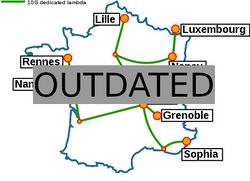Grid5000:Home
|
Grid'5000 is a large-scale and versatile testbed for experiment-driven research in all areas of computer science, with a focus on parallel and distributed computing including Cloud, HPC and Big Data. Key features:
Older documents:
|
Random pick of publications
Five random publications that benefited from Grid'5000 (at least 2937 overall):
- Adrien Schoen, Gregory Blanc, Pierre-François Gimenez, Yufei Han, Frédéric Majorczyk, et al.. A tale of two methods: unveiling the limitations of GAN and the rise of bayesian networks for synthetic network traffic generation. 2024 IEEE European Symposium on Security and Privacy Workshops (EuroS&PW), Jul 2024, Vienna, Austria. pp.273-286, 10.1109/EuroSPW61312.2024.00036. hal-04871298 view on HAL pdf
- Célia Mahamdi. Multi-Consensus distribué : agrégation et révocabilité. Réseaux et télécommunications cs.NI. Sorbonne Université, 2024. Français. NNT : 2024SORUS426. tel-04919363 view on HAL pdf
- Cédric Prigent, Melvin Chelli, Alexandru Costan, Loïc Cudennec, René Schubotz, et al.. Efficient Resource-Constrained Federated Learning Clustering with Local Data Compression on the Edge-to-Cloud Continuum. HiPC 2024 - 31st IEEE International Conference on High Performance Computing, Data, and Analytics, Dec 2024, Bengaluru (Bangalore), India. pp.1-11, 10.1109/HiPC62374.2024.00033. hal-04779813 view on HAL pdf
- Khaled Arsalane, Guillaume Pierre, Shadi Ibrahim. Toward Stream Processing Elasticity in Realistic Geo-Distributed Environments. IC2E 2024 - 12th IEEE International Conference on Cloud Engineering, IEEE, Sep 2024, Paphos, Cyprus. pp.1-9. hal-04655408v2 view on HAL pdf
- Cassandre Vey, Adrien van den Bossche, Réjane Dalcé, Georges da Costa, Olivier Negro, et al.. Experimenting IoT-Edge-Cloud- HPC Continuum on Existing Platforms. 2025 IEEE 25th International Symposium on Cluster, Cloud and Internet Computing Workshops (CCGridW), IEEE, May 2025, Tromsø Norway, Norway. 10.1109/CCGridW65158.2025.00026. hal-05147272 view on HAL pdf
Latest news
Failed to load RSS feed from https://www.grid5000.fr/mediawiki/index.php?title=News&action=feed&feed=atom: Error parsing XML for RSS
Grid'5000 sites
Current funding
As from June 2008, Inria is the main contributor to Grid'5000 funding.
INRIA |
CNRS |
UniversitiesUniversité Grenoble Alpes, Grenoble INP |
Regional councilsAquitaine |


